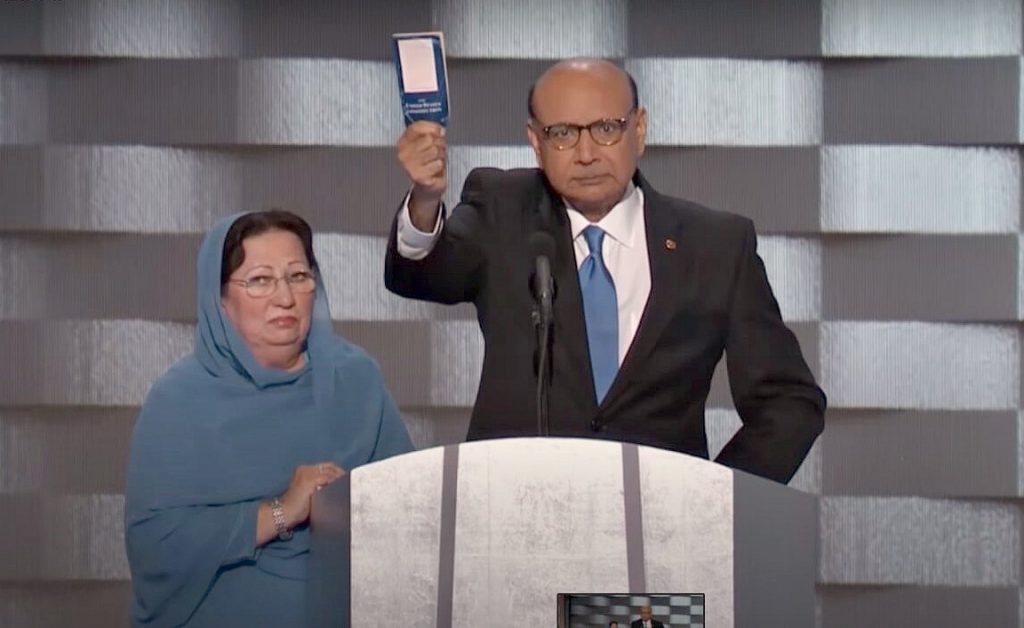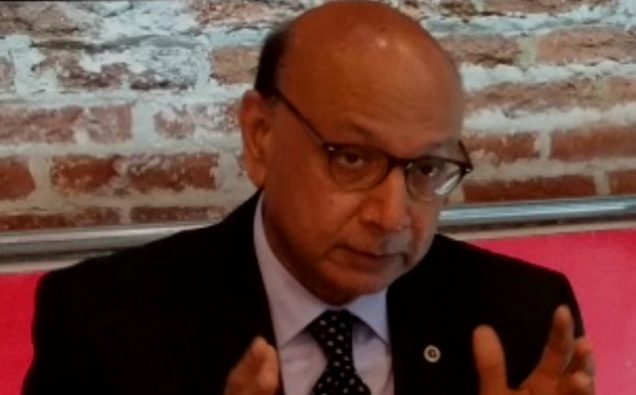For 12 years, the family kept the grief of son’s loss private. But one day, Khizr Khan decided to make a public statement in the middle of an unusually heated election year. Since that July 28 evening, when the Pakistani American challenged Donald Trump’s exclusivist rhetoric by waving a copy of the US Constitution, he and his wife Ghazala Khan have been all over the media.
As respected successful immigrants and Gold Star parents of an American war hero – Humayun Khan who died in Iraq in 2004 – the Khans are now credited with altering the political discourse.
So, what made Khizr Khan stand up against freewheeling Republican candidate that led to a literally overnight transformation for the family, Views and News asked the Harvard-educated lawyer in an interview.
“Enough is enough. Certain issues have to be addressed more publicly. You cannot hide behind it and say, oh, this is a private issue, I am not going to say anything.
“Yes, we did have an option. Going to the podium and saying thank you very much for inviting us, and we are going home. That would have been the end of it.
“But behind that were the concerns. Whenever I go to friends’ homes, relatives’ homes, children, 12-year-old, 15-year-old, they would say are we going to be thrown out of here, we are born here. Are we not going to complete our school? What is going to happen to us?
“So I had that option. But somebody had to take the stand. And I did.”
But Khan’s opposition to Trump’s positions against Muslims and other minorities also stem from a deep sense of obligation to his home, the United States of America, and to keep the United States “beautiful, safe and moving forward”.
That responsibility to stand up against the narrative of hatred and exclusion had increased even more due to Trump’s divisive rhetoric and deepening concerns among American Muslims and other minorities about their future.
Khan emphasizes that the duty is ethical and moral as an American citizen and he also derives it from the teaching of his religion, Islam, which says “protect your home, where you live, where your children live”.
“Most people understood that the motivation for the message was to strengthen our immigrant minorities. Since then, the reception has been an amazing outpouring of love,” said Khan, whose picture waving a pocket size copy of the US Constitution as a challenge to Trump’s views with his wife standing beside him, has come to symbolize a potent voice for American pluralism.
“If I have to do it over again, I will do it a million times. The goal behind it was to strengthen our community so that we can withstand this hatred, this discrimination, this threat that Donald Trump has been espousing for the whole year.”
“It is love of your home, where you live and where your children grow up. You don’t harm your home. You must be out of your mind if you want to think, or if you want to plan to harm your home, or its walls, or its doors. Just because you don’t like the door, you don’t like the corridor, or certain things of your home, you don’t blow it up. You want to make it better. That is the message.”
“It is not just that I am a patriotic American. Oh, America is great! No, there is so much room to make it better. Well, it is our home, it is our chosen home. America did not go and drag me from Pakistan. I came here voluntarily. I came here to find something better. Now that I have found it, it is my obligation to make it even better.”

Khizr Khan and his wife Ghazala Khan at DNC July 2016
Photo: Screenshot/Official DNC Youtube
Trump, who reacted to Khan’s remarks at the July Democratic Convention with criticism of the Khans, had to subsequently quieten and ratchet down from his usual outbursts in the face of widespread condemnation including from top Republican leaders and veterans’ associations.
For his part, Trump argued that Khan did not know him and attacked him harshly, when he challenged the Republican candidate if he had ever read the US Constitution or made any sacrifice for America. Trump went on to suggest that Khan’s wife did not speak at the Convention as many Muslim women are not allowed to do so.
But several political analysts see Trump’s criticism of the US war hero’s family as a watershed moment in the 2016 race for the White House since parents of slain soldiers are held in high esteem by the US society and the state.
Tangled with his backtracking on some other statements – including watching a secret video of America making payments to Iran in exchange for hostages and not endorsing GOP stalwarts like Speaker Paul Ryan and Senator John McCain – Trump’s disrespect for the Khans appears to have cost him dearly as the latest polls put his Democratic rival Hillary Clinton several points ahead with registered voters.
Moreover, officials from several past Republican administrations and politicians contesting election this year have also declared their disapproval of Trump as president and commander-in-chief of the United States forces.
Khan, who has been under mainstream American and global spotlight since mounting a challenge to politics of exclusivism and division – seen as a kind of inherently improbable American Brexit – said he is happy that he has been able to help restrain Trump’s unbridled rhetoric.
“I had that option. Keep it private or take this platform and make a statement that this is wrong. Somebody had to take a stand. I am glad I did. And I will do it a million times for the purpose that gave me the strength.”
Khan said his son Humayun’s bravery – when he saved fellow soldiers by making the ultimate sacrifice- is a “story of looking after who are under your responsibility”.
“That gives us this mission. The children, the future generation is under our responsibility. We can guide them in the wrong direction, or we can leave them wandering and going in every which way, or we can guide them in the right direction, which is to be responsible, to be patriotic, to be decent citizens and protect this world and move forward. So it is that mission. It’s the mission of Captain Humayun Khan who decided in the last moment of his life that he was going to be taking care of others and that would be the legacy he would leave. We are still following that legacy and we are moving forward.”
The US Constitution, he said, specifically, the 14th Amendment adopted in 1866-67, clearly sets out that every citizen must enjoy equal protection of law, “Which means that you and I, a small child, an elderly lady, all religions, anybody within the territory, within the jurisdiction, has equal protection.”
“Nobody can say, oh, you are a Muslim, you have no protection, or you are an Hispanic American, you have no protection. That was the dispute, the issue that was bothering me. That is why I came out and showed it (the US Constitution).”
“I have received since then a lot of encouraging comments from the most senior legal scholars that have written to me and encouraged me that that sends the message to anybody that was thinking that we can exclude Muslims, or we can exclude Indians, or we can exclude other minorities or that we can discriminate on the basis of gender, as Donald Trump was saying.”
“No way. There are guarantees in the constitution that will stop him from even doing that.”
After his Convention speech, Khan said he appreciates that Republican leaders including Senator Mitch McConnell and Speaker of the House Paul Ryan said that Donald Trump’s statement with regard to banning Muslims is against the values of the constitution.
Since Khan’s dramatic emergence on the national political scene and becoming an overnight political voice, people supporting him have launched an online petition that he hold public office and get elected a member of the Virginia House of Delegates.
“I am not interested in any public office, or any position,” Khan, a Hillary Clinton supporter, said, while stressing that his mission is to make sure that that which unites America wins.
Khan believes that Pakistani Americans must take part in politics in order to become an important voice in American democracy.
Since articulating defense of all Americans, irrespective of their background or ethnic affiliation, Khan says he has been greeted by the diverse American communities.
“I have been recipient of their love, appreciation, through their radio programs, television, and newspapers, Hispanic, Chinese, Europeans, Middle Eastern, North American, Canadians, Mexicans, everybody has poured their love, they invite me to their programs, even though I don’t speak their languages but they listen to it, and they admire it, the feedback from these programs is exceptionally encouraging.”













